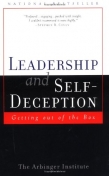BKMT READING GUIDES
Leadership and Self Deception: Getting Out of the Box
by The Arbinger Institute
Paperback : 192 pages
2 clubs reading this now
0 members have read this book
Introduction
This straightforward book explains how leaders can discover their own self-deceptions and learn how to escape destructive patterns. The authors demonstrate that breaking out of these patterns leads to improved teamwork, commitment, trust, communication, motivation, and leadership.
Using the story/parable format so popular these days, Leadership and Self-Deception takes a novel psychological approach to leadership. It's not what you do that matters, say the authors (presumably plural--the book is credited to the esteemed Arbinger Institute), but why you do it. Latching onto the latest leadership trend won't make people follow you if your motives are selfish--people can smell a rat, even one that says it's trying to empower them. The tricky thing is, we don't know that our motivation is flawed. We deceive ourselves in subtle ways into thinking that we're doing the right thing for the right reason. We really do know what the right thing to do is, but this constant self-justification becomes such an ingrained habit that it's hard to break free of it--it's as though we're trapped in a box, the authors say.
Learning how the process of self-deception works--and how to avoid it and stay in touch with our innate sense of what's right--is at the heart of the book. We follow Tom, an old-school, by-the-book kind of guy who is a newly hired executive at Zagrum Corporation, as two senior executives show him the many ways he's "in the box," how that limits him as a leader in ways he's not aware of, and of course how to get out. This is as much a book about personal transformation as it is about leadership per se. The authors use examples from the characters' private as well as professional lives to show how self-deception skews our view of ourselves and the world and ruins our interactions with people, despite what we sincerely believe are our best intentions.
While the writing won't make John Updike lose any sleep, the story entertainingly does the job of pulling the reader in and making a potentially abstruse argument quite enjoyable. The authors have a much better ear for dialogue than is typical of the genre (the book is largely dialogue), although a certain didactic tone creeps in now and then. But ultimately it's a hopeful, even inspiring read that flows along nicely and conveys a message that more than a few managers need to hear. --Pat McGill
Discussion Questions
No discussion questions at this time.Book Club Recommendations
Recommended to book clubs by 0 of 0 members.
Book Club HQ to over 90,000+ book clubs and ready to welcome yours.
Get free weekly updates on top club picks, book giveaways, author events and more








